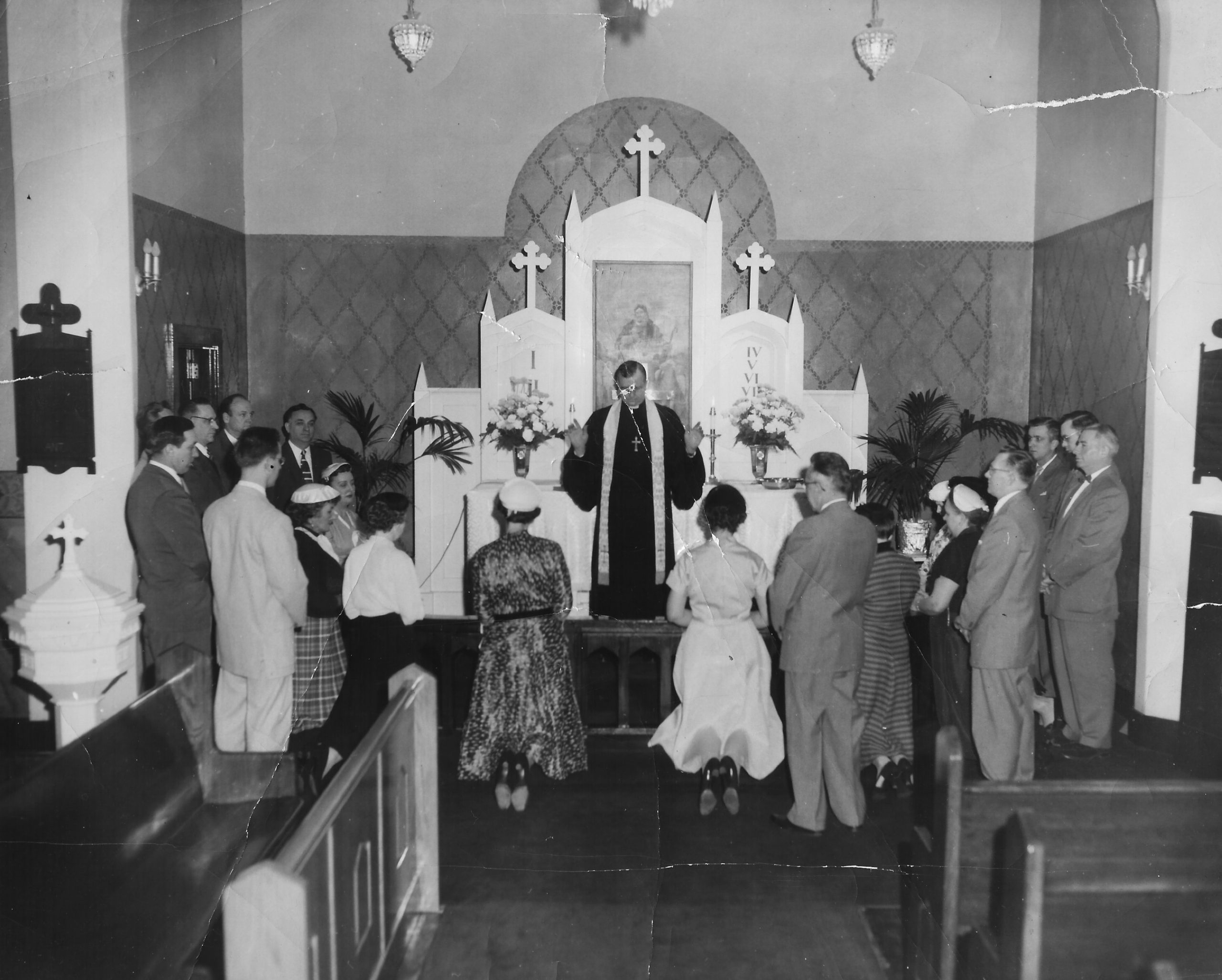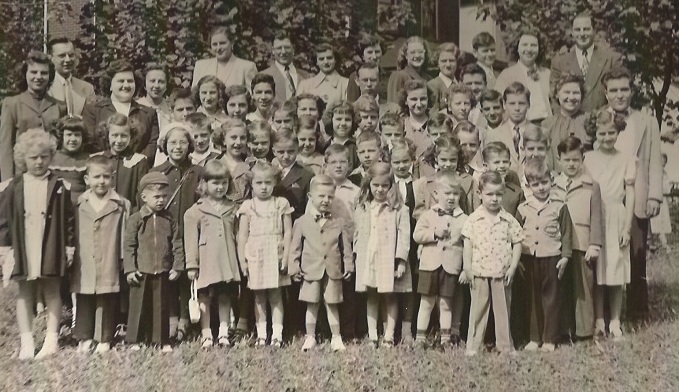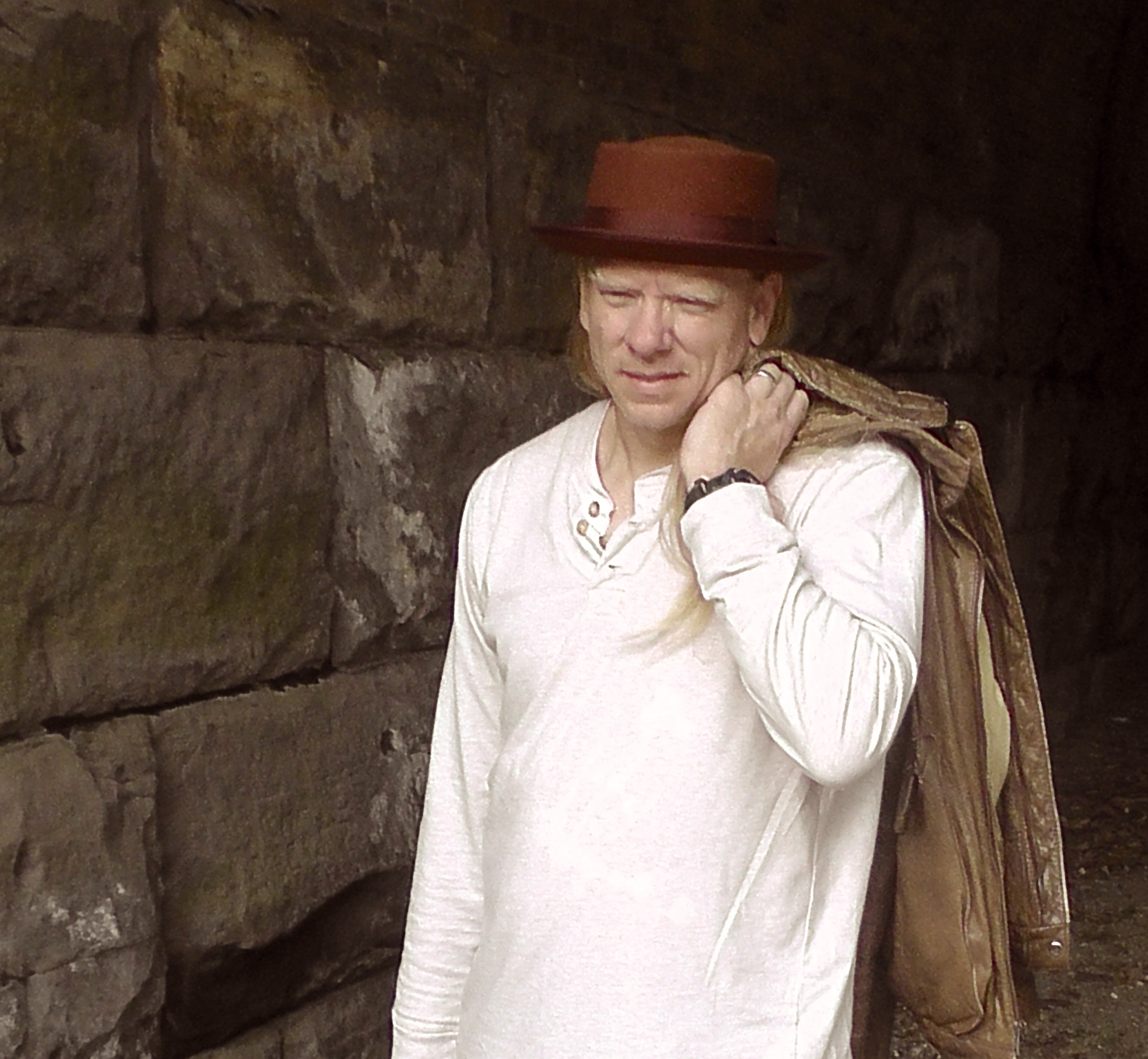About Holy Trinity Lutheran...
Learn more about our long and storied history, and discover what keeps us together and keeps us going. We have a feeling there's a spot for you in our story.Our History
Many thousands of Slovaks immigrated to the United States of America before World War I. A large number settled in the Monongahela (Mon) Valley because of the availability of work. Life was rather difficult for them until they understood and learned the English language.
Holy Trinity is an offspring from St. Paul’s Church, a Slovak congregation in Braddock. In 1921, for some unremembered reason, thirty families left the church, and established a congregation for Slovak Lutherans in East Pittsburgh. Several members journeyed to Irwin, PA, to visit Rev. Paul Putra; and, they requested that he come to East Pittsburgh and conduct Slovak services. The following are some of the highlights over our nearly 100 years of service since then:
June 21, 1921
June 28, 1921
The first meeting to organize the new congregation was held at Hebron Church. Rev. Putra was present to advise on the procedure and agreed to preach twice a month as a supply pastor.
September 10, 1921
A Church School was organized in the Brinton Avenue Grade School with 45 people.
January 15, 1922
The congregation was organized and applied for a charter, which was granted on May 22, 1922.
May 22, 1922
The Ladies Altar Guild was organized with fifty members.
November 12, 1922
A building committee was elected and on January 13, 1923, and they paid the architect’s fee of $400 for designing the building. Ground breaking took place on April 14, 1924. The corner stone was blessed on June 29, 1924. The original estimated cost of construction for the new building was $57.000; however, by the founders doing a lot of the hard work, that cost was reduced to $40,000. This work included excavating the foundation, pouring the concrete, raising the steel girders, capping the brick walls, installing sewers, and many other things too numerous to mention.
December 14, 1924
The first baptism (of Daniel G. Makar, son of Mr. and Mrs. Victor Makar).
February 16, 1925
The first marriage (of Miss Zina Rajcok and Mr. Andrew Malus).
July 15, 1928
Rev. James Sopko accepted a call to be the first pastor of Holy Trinity. He was permitted to have English services one Sunday a month.
January 6, 1930
Rev. Paul Faska was called to be the second pastor. He was called to his eternal rest while serving the congregation on January 8, 1933.
April 1, 1935
Rev. Andrew Balaska received his call as the third pastor. Under Pastor Balaska, the first group of Sunday School teachers were installed and an English Sunday School was started.
May 1952
The parsonage was built for $27,000.
June, 6, 1953
Rev. August Skodacek became the fourth pastor at Holy Trinity on June, 6, 1953. During Pastor Skodacek’s stay, the addition
was built onto the back of the church and renovation of the interior was done for $12,000.
1953
The Mens’s Club was organized.
1957
The new chancel was installed.
June 3, 1958
The first son of the congregation to be ordained into the ministry was Rev. John Adam. Rev. Adam served for
many years as Bishop of the Slovak Zion Synod.
June 1, 1963
The Rev. Andrew Tomo received his call to become our fifth pastor. He faithfully served our congregation until his retirement on July 30, 1990.
September 23, 1990
A call was extended to our current presiding minister, Rev. David Jones, to become our sixth minister in Holy Trinity’s long history.
However, one of our seasoned and respected members, John Partilla, refused for this to be the final word. God placed Holy Trinity in East Pittsburgh for a reason. John acknowledged, in a congregational meeting, the strain of these changes upon the congregation. However, he noted, “There ain’t no Slovaks off the boat anymore. It’s time we minister to those people in the community whom God has given us.”
Holy Trinity is now one of only two congregations remaining from the 28 that once occupied East Pittsburgh during its heyday. The reason for Holy Trinity’s continuation is due to the faithfulness of the members in supporting creative children’s, youth and adult ministries for our community over the last 20 years, including Kidz‘ Church, Young Life, Kidz‘ Club, The Revolution Church, SMILE, and more.
Holy Trinity has had a spiritual transformation: we no longer have a spirit of poverty and entitlement, but a spirit of gratitude and plenty. God has given us everything that we need to accomplish God’s purposes for us. If we do not have it, we do not need it. If we need it, God will provide it when it is necessary.
All thanks be to God.
Our Mission & Vision
Our Purpose is to glorify and to enjoy God by serving our community and spreading the Good News of Jesus Christ.
Mission & Purpose
We do this by meeting regularly for worship and praise, submitting to the will of God as understood through the Holy Scriptures and by the guidance of the Holy Spirit. Meeting the needs of the entire body of Christ through fellowship, sharing and community, and helping believers and non-believers grow in their relationship with Jesus Christ.
Meet the Pastor
A brief introduction…
“My name is Dave, DJ, Pastor Dave, PD, P Dave, or even P Diddy. I am unconcerned about titles. Even the nomenclature of “Pastor” is a relational term: if I have a relationship with a person, and they see me as their Pastor, then, by all means, they are welcome to call me pastor. Just don’t call me David. That’s a name reserved for my mom.
I live in Pittsburgh, PA, and have been Lead Pastor of Holy Trinity Lutheran Church since 1990. I have been privileged to share my life journey with my spouse, Ella, since 1985. We have one daughter. We also have 3 dogs, a cat, 2 chinchillas, a rabbit and a horse. We like animals.
I love riding bicycles, pedaling about 5,000 miles/year. While I had a long running career in track & field and cross country, I am no longer able to run. Fortunately, I get my track & field fix as the head coach at Trinity Christian School. In addition to sports, I love music: writing music, playing music, singing music, and listening to music. It is my prayer language, and my most intimate connection with God.
I have been blessed to have had a life-long relationship with Jesus. I cannot remember a day going by that I did not know Christ’s love for me. I don’t have a great transformational testimony. As a result, I have often felt inadequate next to those that do. However, one day, after giving my “boring” faith testimony, the man whom Jesus had brought through drugs and rebellion came to me with tears in his eyes and said to me, “I wish that my journey in faith had been more like yours.” My journey with Jesus has been a privileged journey of never knowing that type of spiritual lack.
I don’t claim to know much about God except this:
- God created the world and all that exists
- We were created for three purposes: 1) Love God; 2) Love each other; 3) Care for God’s Creation
- We have done everything in our power to destroy every relationship that God has given to us
- However, God would rather die for us than live without us. Therefore, God spoke THE Word of love and reconciliation: Jesus.
I have a BA in Communication & Religion from Houghton College, NY; a Masters of Divinity from Luther Seminary, St. Paul, MN; and, a Masters of Theology from Pittsburgh Theological Seminary. I am currently working on my PhD in Theology at Duquesne University. Yet, none of these degrees impress God much, nor do they impress the members of Holy Trinity. After all, the most godly man I have ever met only had an 8th grade education. Therefore, I am grateful that I am a Christian because of God’s choosing of me., not because of any knowledge that I may claim to have.
I believe that the world needs another “Lutheran” revival to remind the Church, and the world, that it is by grace that we are saved, through faith, not of works. In recent days, the American church has forgotten its first love, Jesus Christ, and has colluded with political power, forgetting that our human made politics, at their best, only deliver a relative righteousness. Jesus’ politics are the politics of the kingdom of heaven: God sits on the throne and is the source of all blessing; and, love is the only law, a law that cannot be legislated or compelled by force without it ceasing to be love. The American Church, by colluding with power (the political right or left) has demonstrated that we have a fundamental lack of trust in the Holy Spirit: we want to change people to be like us BEFORE they are welcome into our churches and can fellowship with us.
However, the truth is that we all fall short. It is not our job to change people at all, only to proclaim Jesus’ love. The Holy Spirit does the convicting and changing. For this reason, at Holy Trinity, we accept people regardless of their circumstances in life. There are none of us too broken that Jesus’ love cannot bring healing and hope.”
Your Partner in Christ,
Pastor Dave
F.A.Q.
Frequently Asked Questions
What is a Christian?
Christians believe that humans were created to be in relationship with God. Unfortunately, we humans have willfully disobeyed God, breaking our relationship with God. Left to our own selfishness, we humans have destroyed the world, destroyed each other, and destroyed our relationship with God.
Yet, God loves us too much to allow our destruction to continue. God responded to our selfishness by telling us a true story about God’s love for us. This story is Jesus Christ. Jesus proclaimed the Good News that our selfishness can be destroyed: we are not defined by this brokenness. We can have our relationship with God and each other restored.
However: there is a price. We must die to our selfish nature and become new people.
Some people could not accept the message of Jesus Christ so they killed him by nailing him to a cross. Those who killed him either did not believe that they were selfish; did not believe they needed God; or, did not want to hear the price of God’s love.
So, Jesus died. Yet, what appeared to be a tragedy was God’s plan all along!
Jesus was not simply a misunderstood, nice man who was wrongfully killed. Jesus is God’s Word of love.
Jesus’ death was not the end of God’s love story. Jesus not only died, but after 3 days, Jesus rose again. Jesus proves that, despite our brokenness and selfishness, God has the power to not only forgive us, but to give us new life. Not even death can separate us from God’s love.
God invites every human being to share Christ’s forgiveness, love, and healing power. There is no person on earth whom God does not yearn to call “My Child.” We cannot earn that title. It is a free gift of God as told to us and given to us in Jesus Christ.
What must we do to become a Christian?
We do NOTHING. This is the hardest thing for people to accept. In this world, there is no such thing as “free.” Yet, God has done all that is necessary so that we might be God’s children.
A more appropriate question to ask is, “What will God do to me?”
God wants to take away the selfishness that is within us, and replace it with love. Being a Christian is a life long process of dying to our selfish ways, and becoming a new and loving person in Jesus Christ. We do not grow up into mature adults in a day. This is why people who call themselves Christians are still selfish people, even though God is working in them. It takes time to grow up.
God is already at work in us, bringing us to those points in our lives when we see our selfishness and need for Christ, and finally admit: “I am a broken person who cannot put the pieces of my life back together.”
For some Christians, this admission may be a dramatic conversion experience, a time when the person commits one’s life to Jesus Christ. For others, it is a slow, but growing recognition of one’s need for God: a daily surrendering of one’s life to Christ’s will.
What is Jesus Christ doing in your life? Have you come to that point in your life when you recognize that your life is out of control, and that you can no longer live the way you are living? This may hurt, but it is God at work in your life. Once you recognize your need, Christ’s next work is to bring healing, hope, and love in your life.
But, what can we do?! The only thing we can do is to respond to what God has already done. We can ask for forgiveness. We can pray that God would continue working and filling our lives with his love. We can ask for God to give us strength. We can commit ourselves to a worshiping community of faith called the church. We can do all of these things, but none of them earn merit, love, or forgiveness. God’s love is a free gift, a gift that has already been given in Jesus Christ before we were even born. All we can do is respond to that free gift with gratitude.
Do I need to belong to a Church?
The church is a place where our faith in Christ is born, nurtured, supported, and grown. Without the church, a Christian will stop growing in faith. Without the church, there are many people who will never hear about what God has done for them. The church is a body of people through whom Jesus Christ has chosen to spread the message of his love.
The church is not a building. The church is not a place. The church is the gathering of Christians who pool together their talents, spiritual gifts and passions; and, as a consequence of this gathering, fulfill Christ’s mission to love the world. Without the church, continued growth in faith is impossible. Without the church, God’s work in the world does not get done.
In the church, faith is nurtured by the sacraments of Baptism and Communion, by the hearing of God’s Word, and by the encouragement of one another. In the church, our faith is challenged and has the potential to blossom as we discover the gifts God has given to us, and are able to articulate how God has called us to use them. An individual’s gifts, in of themselves, are not capable of changing peoples lives or making a difference in the world. Yet, when the gifts of many are gathered together, the church can turn the world upside down for Jesus Christ.
In answer to the question: Yes. The church is not an option for Christians. It is a necessity.
Slovak Zion Synod
All congregations and pastors must be accountable to others outside of the congregation so that they may be nurtured and provide nourishment for others. Therefore, Holy Trinity is part of a Synod, or a living together of 20 congregations under the leadership of Bishop Wilma Kucharek. We gather together regularly to support one another and to accomplish ministry that would be impossible by ourselves. Together, we provide support for the Lutheran Seminary in Bratislava, Slovakia; we support missionaries to Eastern Europe and to the Roma (gypsies); we help train pastors for service to Christ’s church and more. Holy Trinity lives our faith together with these Synod partners.
ELCA
Our congregation and our Synod is connected to a larger expression of the church, the Evangelical Lutheran Church in America. The ELCA is the largest Lutheran body in the world. Together, our 65 synods, 9,000 congregations, and 3.4 million members provide missionaries, emergency assistance, educational materials, spiritual support and more to places throughout the world that would not be possible were we traveling this journey alone.



